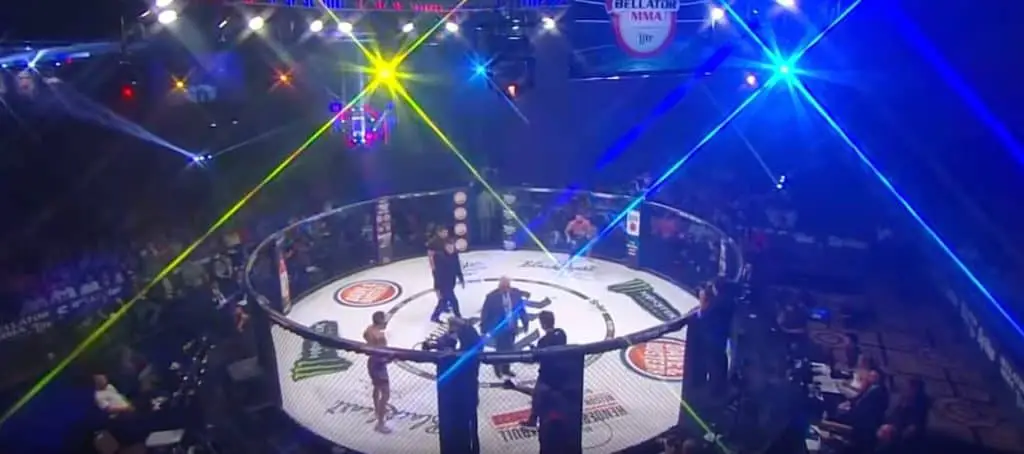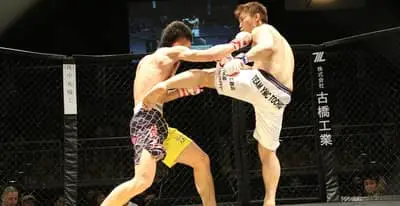
MMA becomes more and more popular and the number of people who want to compete is increasing. People with experience in other combat sports such as boxing; kickboxing, Muay Thai, BJJ, and others want to test themselves inside the cage. There are also a lot of people with little to none combat sports experience who also fight by the rules of MMA. But how exactly do those people get their first MMA fight? This is the subject we are going to discuss in this article.
How to get your first MMA fight? There are two ways to get an MMA fight:
- Start going to an MMA gym that has a fighting team, and just tell your coach you want to fight.
- In case there isn’t such an MMA gym nearby or you just can’t/don’t want to go to such a gym for some reason, you need to contact MMA organizations that host MMA events in your area and ask them if you can fight as an unaffiliated fighter.
Nowadays is quite easy to get an MMA fight. MMA isn’t illegal anywhere in the US, UK, Canada, and other big countries. Also, as I already mentioned, MMA is very popular nowadays and there are 100+ registered MMA organizations according to Wikipedia.
Assuming you are inexperienced so you’re most likely be accepted by small local promotions. I mean, I hope you don’t want to go to the bigger worldwide promotions such as UFC or Bellator if that’s your first fight because you’ll need some experience before that (at least 7-10 fights).
Although the article is for people new to the fighting game, there might be some more experienced fighters reading it. If you are one of those and want to get to the bigger organizations, here are some links for you:
In the rest of the article, I go in more detail on the two ways to get an MMA fight I mentioned at the beginning, what exactly you need to do and what problems to expect.
1. Start going to a proper MMA gym
This is the best way to get into MMA because you’ll actually learn how to fight before going to fight inside a cage. The problem is that this may be the hardest and the most time-consuming way to get an MMA fight. You need to ask your coaches to let you fight and it’ll take some time before they agree that you are ready.
You’ll fight against someone from another gym and coaches want to make sure they send the best fighters to represent their gym. Also, of course, they don’t want you to get hurt because unlike other combat sports MMA is a real fight.
The good think about choosing this way is that you don’t have to do much – no self-promotion, no contacting different organizations. The only thing you need to do is to say to your coach: “I want to fight” and then listen to his advice and train hard half a year. It’s simple but very hard.
In case you want to be a part of an MMA gym fighting team, you’ll most likely need at least 6 months of consistent training before your first MMA fight. Your coaches will be watching your progress push you hard and tell you when you are ready.
Often when promotions are searching for new fighters, they are contacting coaches from local gyms. They either search for fighters specific weight classes (for example, they might say: we need a 155 and two 205 fighters for a tournament next month). Or they might want fighters with specifics record – “we need someone who has 1-2; 4-5 etc fights on his record”. But often they are ok with debuting fighters if coaches guarantee that they are ready.
The process by which you sign up for an MMA fight is generally providing some contact information (online or on a paper document), including your weight, height and reach and getting checked by a doctor before the fight. You should know in which weight class you want to compete and make the necessary weight before the weigh-ins. Then you’ll get matched with someone with the relatively same level of experience weighing as much as you.
In some tournaments, there’s a small fee to compete (if you are an amateur) but you should avoid joining tournaments that charge unnecessary big entry fees.
How to find a good MMA gym
There are a lot of bullcrap MMA gyms out there that you should avoid. But even if the gym is legit, it may not have an MMA fighting team or support MMA fights.
To make sure you join the right gym, check if it has an MMA fighting team. You can do that by looking at the gyms website or social media or just asking the staff or the coaches. Also if you can find out when was the last tournament in which fighters from the gym you chose competed. The sooner it was, the better.
2. Fight as an unaffiliated fighter
In case you don’t train in an MMA gym or your gym doesn’t support MMA fights, you can fight as an unaffiliated fighter and get matched with another unaffiliated fighter. Those fighters usually suck, they are just people who don’t have much fighting or combat sports experience in general and just want to try it.
Also sometimes unaffiliated fighters don’t even show up for the fight so you can see that they aren’t exactly building an MMA career.
How to get an MMA fight as an unaffiliated fighter
You can do that online, by just googling “amateur MMA tournaments” in your region and visiting their website. Some organizations, for example, WFC, Cage Wars or CamoMMA (California Amateur MMA organization) have great forms on their website for people who want to compete.
- Camo MMA Registration – you can use that form to apply not only as a fighter but also as promoter and official – referee, judge, inspector, etc
But those are just the sites I’ve found during my research, you can do your own research for your specific region.
For instance, I googled “MMA promotions California” and found this website listing all the MMA events happening in the near future. There you can find not only promotions but also see more information about the events. For example, what fighters are going to compete – weight classes experience, etc.
You can also see the promotions hosting the events and Google them to find their website. Here’s one of the promotions I’ve found during my quick research: lightsoutxf.com. On their website, there isn’t cool from to fill like the examples above but there’s contact information.
After you find the contact information (email, phone), contact them, say you want to compete as an amateur and that it will be your first fight, tell them about your experience in combat sports (what sports have you practiced, for how long, have you competed in any of them, etc).
Tell them how old are you, what is your current weight (or in which weight class you can compete). Your height and reach can be useful information as well. That will make it much easier for them to see in which event they can let you compete and find you а suitable opponent.
Also if you can send some footage of your training; sparring that can help too.
Be careful
Sometimes there are some people who have years of experience in BJJ, Muay Thai, self-defense or other types of gyms but their gyms aren’t supporting MMA fighting so they fight as unaffiliated fighters.
Such fighters can have years of experience in different combat sports which is a huge advantage when fighting unaffiliated fighters which are usually inexperienced people.
So make sure you get as much information from the promotion about your opponent to avoid fighting someone much more experienced.
Tips for your first fight
Here are some quick tips for your first MMA bout.
- Check the tournament rules – Most organizations have adopted the unified rules of mixed martial arts (which I recommend checking out) but still, the rules may vary a little from tournament to tournament
- Strength and conditioning – The closer the fight night is, the less strength and conditioning you should be doing. Outside training camp ()when preparing for a fight) it should be around 20% or your workout time but by the end of the training camp, it should be less than 10%. That way you will make sure your muscles aren’t sore on the fight day.
- Buy your own gear – The organization most likely won’t provide the gear you need to fight (gloves, wraps, steel cup, mouthpiece). They’ll just inspect the gear your bring.
Turning pro
If your goal is to turn pro, you need to know some things.
Once your turn pro you can’t compete again as an amateur anymore. So you need to take as much amateur fight, to get as much experience as possible before turning pro.
Some people go to the extreme and fight more than 50 times as amateurs but I think 10 fights are more than enough. That will help you to build your confidence and the experience you need to become a solid professional competitor.



